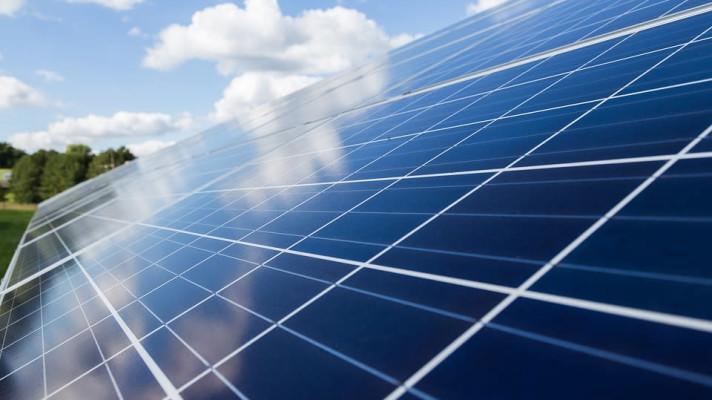Reducing the potential 'ecological trap' of solar panels
Solar panels are attractive to aquatic insects because they reflect light in a similar way to water, indicates recent research. This has ecological implications, especially if insects lay eggs on the panels. However, if panels are surrounded by white borders and divided by white grids, they are considerably less attractive to the insects.
Shiny, dark-coloured objects, such as oil lakes and glass buildings, can reflect light in such a way that they appear to be bodies of water to aquatic insects. This is because the smooth surface of water and glass polarise light, i.e. the light waves all travel on the same level, unlike sunlight which is non-polarised and light waves move in different planes. Over 300 aquatic insects use polarised light as a cue to identify lakes and rivers. Shiny dark objects, such as solar panels, could be an 'ecological' trap where insects mistake them for water and mate or lay their eggs there. This could lead to increased predator attack and reproductive failure.
The study examined the attractiveness of photovoltaic solar panels and artificial surfaces of varying brightness to some aquatic insects that are known to use polarised light as a cue for water. The insects observed were mayflies, caddis flies, dolichopodids and tabanid flies.
The results demonstrated that vertical solar cells and black plastic sheeting polarised light even more than water, which suggests that these artificial surfaces could become an ecological trap. In comparison, solar panels with white frames and panels partitioned into a grid reflect weakly polarised or non-polarised light and are less likely to become traps.
Black framed solar cells were more attractive than white framed solar cells as they attracted 6.9 times more landings from mayflies than white framed versions. Dividing the surface with white tape also reduced attraction for all insects.
Mayfly captures per square metre of a shiny black surface were 16.7 times higher on a non-partitioned surface compared with a partitioned surface. For caddis flies, captures were 26.5 times higher, and for dolichopodids, captures were 10.3 times higher.
Similar, although not quite so extensive, differences were found when comparing two types of solar panel: a plain black solar panel and a white-framed solar panel that had small black cells with narrow white margins between them. Mayfly capture was 6.6 times higher on the plain black solar panel than on the white-gridded panel. Dolichopodid capture on the completely black panel was 2.7 times higher. Attraction for tabanids also seemed higher on the black panel as they touched down 8.7 times more frequently (tabanids could not be captured like the other insects studied).
The results indicate that a white grid partitioning on a solar panel will reduce or eliminate its reflection of polarised light and therefore reduce its attractiveness to aquatic insects. However, the grid also slightly reduced the surface area of the panel and therefore its performance. For the white gridded panel in this study, the loss was estimated at about 1.8 per cent.
Although the research only studied the attractiveness rather than the actual ecological impacts in terms of reproduction and predation, it indicates that caution is needed in the placement and design of panels, particularly where endangered species may be affected.
Source: Horváth, G., Blahó, M., Egri, A. et al. (2010) Reducing the Maladaptive Attractiveness of Solar Panels to Polarotactic Insects. Conservation Biology. 24(6):1644-1653.
Contact: roberbal@msu.edu
